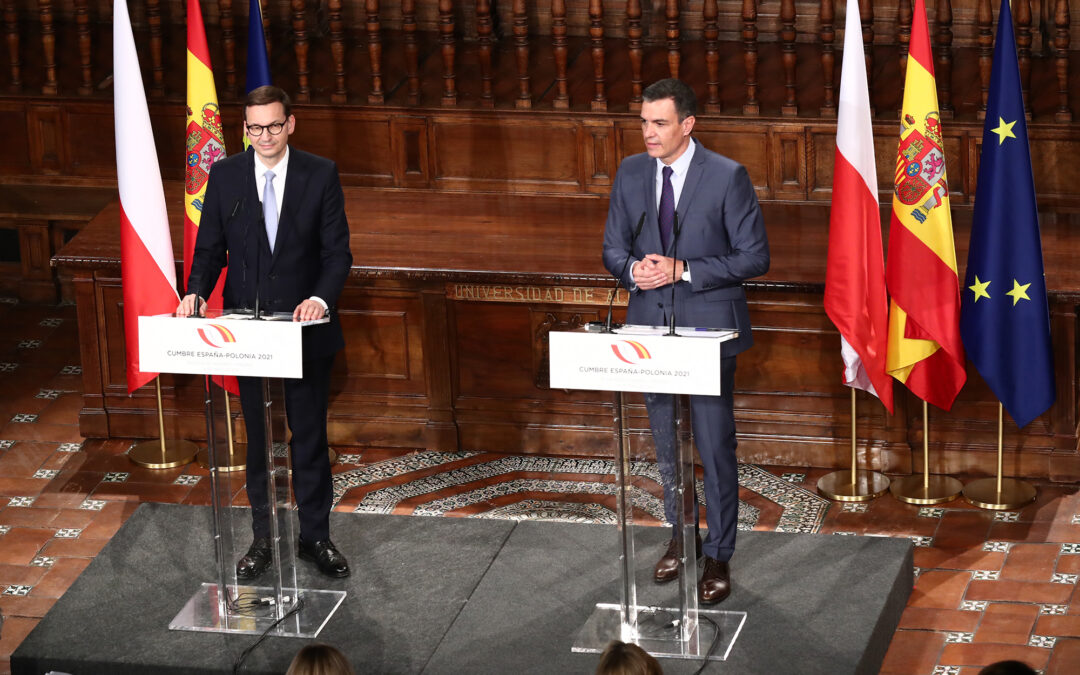Poland has signed an agreement with Spain to cooperate on a major infrastructure project near Warsaw, known as the Solidarity Transport Hub (CPK), which will include a new “mega-airport”, railway interchanges and road connections.
The agreement was signed during a two-day visit to Spain by Poland’s prime minister, Mateusz Morawiecki, who was accompanied by five members of his cabinet for intergovernmental talks that focused on external EU security, economic recovery from the pandemic, climate, migration and infrastructure.
Polish-Spanish intergovernmental consultations begin. It is the most important format of cooperation between 🇵🇱and 🇪🇸since 2003. Both for #Poland and #Spain, intergovernmental consultations are reserved only for strategic partners. pic.twitter.com/RpHOEdQDFS
— Chancellery of the Prime Minister of Poland (@PremierRP_en) May 31, 2021
During the visit, the countries pledged to work together on the development of Poland’s high-speed rail system. The CPK project includes plans for the construction of around 1,800 kilometres of new railway lines along 12 routes by 2034.
An agreement was signed by Poland’s deputy minister for infrastructure, Marcin Horała, who responsible for the CPK project, and Spanish transport minister José Luis Ábalos.
“Spain is one of the world leaders in the development and management of high-speed rail, and the Polish side is interested in drawing on their experience,” wrote CPK in a statement on Monday. Spain’s Alta Velocidad Española (AVE) high-speed railway is the largest such network in Europe.
For more about the government's lofty ambitions for Polish aviation, see our recent report: https://t.co/mpHfMksFYw
— Notes from Poland 🇵🇱 (@notesfrompoland) October 29, 2020
“International cooperation is a strategic element in the construction of CPK,” said Horała, cited by Wprost, adding that he was hoping for an “exchange of know-how”. He noted that similar cooperation has been established with the UK, France and South Korea.
Horała said that such agreements are a “clear signal from western partners” that the CPK – which the opposition has criticised as an unnecessary expense given the existence of four airports in Warsaw’s vicinity – is a “necessary, profitable and very valuable investment for the entire Central and Eastern Europe [region]”.
The 10 billion (€2.2 billion) zloty CPK project centres around plans for a mega-airport to be built in Baranów, a village 50 kilometres west of Warsaw. Construction is due to begin in 2023, with an opening pencilled in for 2027.
The airport is expected to initially serve 45 million passengers a year, which would put it in a similar league to London Gatwick (which had 46.5 million passengers in 2019). The aim is to eventually expand to 100 million a year, which, on pre-pandemic figures, would make it the second busiest airport in the world alongside Beijing and behind only Atlanta.
PM @MorawieckiM: Poland and Spain are the border states of the EU. We will support Spain in building a Southern Partnership. If Europe is under threat, it is from the east and the south. We are ready to cooperate in all fields. pic.twitter.com/oo8oSB5cNi
— Chancellery of the Prime Minister of Poland (@PremierRP_en) May 31, 2021
The talks, which were the first bilateral meeting between the two countries in four years, were also attended by Poland’s foreign, interior, development, infrastructure and climate ministers. They were held in the city of Alcalá de Henares, which has the largest Polish diaspora living in Spain, members of which Morawiecki met on Sunday.
During the visit, Morawiecki said that Poland would “support Spain in building a Southern Partnership” with the EU’s neighbours in North Africa and the Middle East. That “flank is very important” because, “if Europe is under threat, it is from the east and the south”.
“Our goals are to strengthen our external security, cooperation with third countries,” said the prime minister, noting that Poland had been active in the EU’s Eastern Partnership programme, which aims to strengthen the bloc’s relations with six post-Soviet states.
During a visit to Georgia last week, Poland’s president, Andrzej Duda, voiced support for Georgian, Moldovan and Ukrainian efforts to join the EU. He pledged that Poland would “always be a sure ally” in “promoting Georgia integration into Euro-Atlantic structures”.
Morawiecki said he has also discussed tax havens with his Spanish counterpart, Pedro Sánchez. “These multinationals should pay taxes in the countries in which they operate rather than using artificial legal schemes,” he said.
Main image credit: La Moncloa – Gobierno de España/Flickr (under CC BY-NC-ND 2.0)

Maria Wilczek is deputy editor of Notes from Poland. She is a regular writer for The Times, The Economist and Al Jazeera English, and has also featured in Foreign Policy, Politico Europe, The Spectator and Gazeta Wyborcza.




















